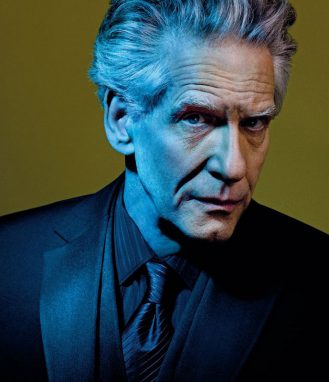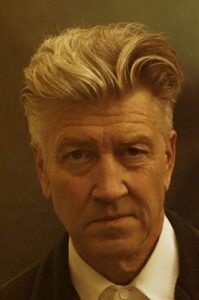David Cronenberg
David Cronenberg and David Lynch: two visually gifted, unabashedly idiosyncratic filmmakers, both drawn to bizarre and grotesque subject matter. This, as well as the fact that both share the same first name, appears to have resulted in the two being continually compared and contrasted, either as rivals or a sort of weird movie tag team.
This is evident in reviews, articles and even interviews. In a 2008 interview with Cronenberg he was asked “Who is weirder, you or David Lynch?” Cronenberg’s answer: “Oh, Lynch is way weirder than I am. That’s obvious.” See also a Suicide Girls interview with Lynch in which the interviewer mentions Cronenberg with the proviso that “I’m not comparing the two of you,” to which Lynch answers “Good.” (Clearly he’s heard such comparisons before, and is tired of them). There are of course many other filmmakers of the same generation who tend to favor the freakish, including Terry Gilliam, Brian de Palma, John Carpenter, Larry Cohen, Paul Schrader, John Waters, George Romero, William Friedkin, Wes Craven, Tobe Hooper, Werner Herzog, Andrzej Zulawski and Dario Argento, but despite quite a few points of similarity (Carpenter and Craven, I’d argue, have career trajectories as similar as those of Lynch and Cronenberg) none of those names have become intertwined in the media like those of the two Davids.
Cronenberg’s answer: “Oh, Lynch is way weirder than I am. That’s obvious.”
It’s also a fact that supporters of one of the Davids always tend to bash the other. This is particularly true of Cronenberg fans, who in tributes often feel the need to take a swipe at Lynch—see J. Hoberman’s L.A. Times Cronenberg tribute “Is David Cronenberg Our Most Original Director?,” in which Lynch’s films are likened to “experiments (that) have blown up in the lab,” and also Jared Walters’ “Of Coens and Cronenberg,” which equates the Coen Brothers’ extremely Lynchian film BARTON FINK, unlikely enough, with the work of Cronenberg, while claiming that Lynch “should be forgotten.” Even worse, many commentators feel the need to pit the two Davids against each other in pieces like the numerous “Cronenberg vs. Lynch” surveys that have appeared online.
Speaking for myself, I grew up with the films of both men and so can’t really choose a favorite. Furthermore, I feel the comparisons are off the mark, a manifestation of an insidious trend summed up by Cronenberg’s own mid-nineties lament about the media’s “desperate need to make connections at all costs.”
It’s a fact that despite their shared love for bizarre subject matter David Lynch and David Cronenberg couldn’t be more different. Lynch, after is all, is staunchly all-American in his obsession with small town Americana (it’s no coincidence that he created a TV series entitled AMERICAN CHRONICLES) while Cronenberg is quintessentially Canadian in most every respect. Cronenberg’s approach, furthermore, is resolutely clinical and intellectual, while Lynch tends to favor surreal abstraction and sentimentality (many critics mistakenly described the sappier elements of BLUE VELVET as “ironic,” which couldn’t be farther from the truth).
Yet I will concede there are definite points of similarity. Both Davids emerged from the underground film movement of the late 1960s, and completed their respective debut features around the same time, with Cronenberg’s SHIVERS appearing in 1976 and Lynch’s ERASERHEAD a year later. In the eighties the two turned down offers to direct RETURN OF THE JEDI—for which Lynch was reportedly George Lucas’ first choice and Cronenberg his second—-only to get bogged down in expensive Dino de Laurentiis produced science fiction projects, Lynch with DUNE and Cronenberg with an early version of TOTAL RECALL that was never made (I say Cronenberg got the better deal). Dino de Laurentiis proved precipitous in both men’s careers beyond those projects, with Lynch’s BLUE VELVET and Cronenberg’s THE FLY both distributed by the short-lived De Laurentiis Entertainment Group, and released within a month of each other in 1986.
1997 was another synchronous period, as Lynch’s LOST HIGHWAY and Cronenberg’s CRASH made their unsuccessful U.S. bows that year. This occurred after the two had undergone severe backlashes in the earlier part of the decade, Lynch with TWIN PEAKS: FIRE WALK WITH ME, the much-hated big screen prequel to his TWIN PEAKS TV series, and Cronenberg with M. BUTTERFLY, his poorly received attempt at award-caliber moviemaking.
David Cronenberg’s M. BUTTERFLY (Trailer)
There’s also the fact that Lynch and Cronenberg tend to alternate cast members, such as Jeremy Irons, Willem Dafoe and Naomi Watts, and were bankrolled by Mel Brooks’ art film outfit Brooksfilms. But the similarities end there.
In recent years the two careers have diverged mightily, as Lynch, in the words of one critic, “has lost his interest in narrative conventions, (and) may have a hard tome reconnecting with audiences.” As it turned out he didn’t try, growing increasingly hermetic and apparently quitting filmmaking altogether after the 2006 release of INLAND EMPIRE, certainly his most idiosyncratic effort since ERASERHEAD. Cronenberg appears to have gone the opposite route, broadening his output with (supposedly) commercial fare like A HISTORY OF VIOLENCE, EASTERN PROMISES and, most recently, MAPS TO THE STARS, his first film to be shot entirely in the U.S.
As for the alleged rivalry, it’s said to be rooted in the fact that Lynch’s 1999 film THE STRAIGHT STORY won no awards at that year’s Cannes Film Festival, whose jury was headed by Cronenberg. Lynch retaliated, allegedly, by denying any prizes to Cronenberg’s SPIDER when he chaired the Cannes jury in 2002. That claim, however, remains unproven.
David Lynch’s THE STRAIGHT STORY (Trailer)
David Cronenberg’s SPIDER (Trailer)
Ultimately I predict the two Davids, each of whom is beginning his eighth decade, will conduct their careers just as they always have: on their own staunchly individual terms, irrespective of what the other is up to. Equally certain is the fact that the comparisons, inappropriate and/or off the mark though they may be, are certain to continue.


